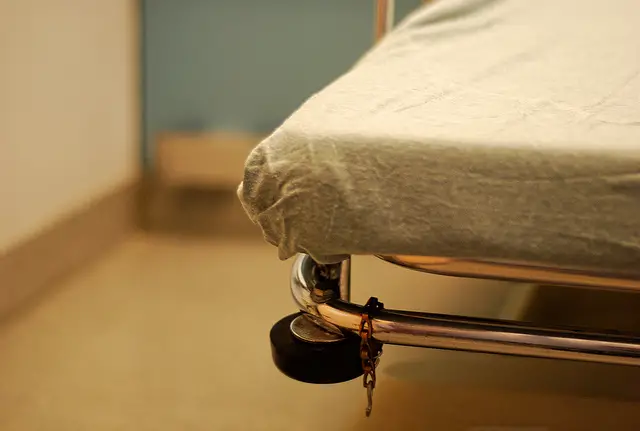England’s Chief Inspector of Hospitals has told Isle of Wight NHS Trust that it must make further significant improvements to the quality of its services after an inspection by the Care Quality Commission.
The Isle of Wight NHS Trust provides acute, ambulance, community and mental health services to a population of 140,000 people.
An inspection in November 2016 led to the trust being rated as Inadequate and it was subsequently placed into special measures.
Latest inspection
In January 2018 inspectors carried out a comprehensive inspection of all core services at the trust. CQC also looked specifically at management and leadership to answer the key question: Is the trust well led?
This time the trust is rated as Inadequate overall, and rated Inadequate for safety and well led. Effectiveness and responsiveness were rated as Requires Improvement and Caring is rated as Good. There have been some improvements, however the trust will remain in special measures.
Removal of condition
As a result of improvements over the past year, CQC has removed a condition which required the trust to ensure the mental health acute and rehabilitation inpatient environments were fit for purpose and operate an effective system to prioritise patients who urgently need access to community mental health services.
But a similar condition on community mental health services will remain in place until the trust can demonstrate improvement in those services.
Baker: “Growing momentum and desire to improve”
The Chief Inspector of Hospitals, Professor Ted Baker, said:
“Since our last inspection of the Isle of Wight NHS Trust in November 2016 we have seen a growing momentum and desire to improve.
“The trust has a new Chair and Chief Executive in place who have started to build an experienced leadership team with the skills and abilities that are needed to provide the high-quality services that are required on the island.
However, not all managers within the trust had the necessary experience at this stage to make the demonstrable impact on the quality and sustainability of services that was needed.
“While we have seen sufficient progress to remove restrictions on some mental health services – we still need to see further improvement in community mental health services.
“There are some areas where we still have significant concerns about patient safety.
“The trust will remain in special measures until we see signs of sustainable improvement across the services provided by the trust.
“NHS Improvement continues to work with the trust to monitor progress, but it will require continuing support from other external stakeholders to help the trust keep up the momentum to put in place the full scale of improvements that are needed.
“We will continue to work in partnership with those stakeholders, and we will return in due course to monitor and check that these significant improvements have been made.”
Dedicated and committed to patient care
Inspectors found that despite the pressures, there were many areas where staff were dedicated and committed to patient care.
Staff did their utmost to provide care that was compassionate, involved patients in decision making and provided good emotional support to patients and those close to them.
However, staff did not always follow best practice to keep patients safe from infection.
Some areas of low staff satisfaction
There were areas where inspectors saw low staff satisfaction and staff working in isolated teams. Staff could be perceived as defensive when under pressure.
Some leaders did not always promote a positive culture that supported and valued staff, leaving some doctors disengaged.
Areas of concern
Systems for checking safety were not fit for purpose in some services. In surgery doctors were not always following safety checks. Staff did not always manage risks to keep patients safe from avoidable harm.
While there was some improvement in reporting serious incidents it was not embedded across all services. Some staff did not recognise or report incidents or near misses and there was limited evidence of learning from incidents.
Patients could not always access services when they needed them and this was of particular concern for patients in mental health crisis units.
Patients were not always discharged from services in a way to meet their needs. Delayed discharges led to waits and crowding in the emergency department and wards, and mixed sex breaches in critical care units.
111 Service
The NHS111 service is rated as Requires Improvement (a fall from ‘Good’ in May 2017). While service performance was discussed at senior management and board level limited action was taken to improve achievement against national targets. Staff were often unable at times to take time off for sickness absence, planned annual leave and rest breaks.
The trust’s urgent care services (out of hours services) was rated as Requires Improvement and while there had been changes to the GP out of hours and walk in service with a revised leadership structure since October, staff did not always feel that they were supported by the management arrangements.
CEO: Still have “hard work ahead of us to turn things around”
IW NHS Trust Chief executive, Maggie Oldham, was said by the inspectors to have ‘demonstrated exceptional leadership skills’.
Maggie said,
“Although the Trust remains rated as ‘inadequate’ overall, the CQC identified a number of areas of progress, including several examples of outstanding practice. It was pleasing to see the CQC find ‘clear signs of recovery and improvement’
since its last inspection and that there is ‘growing momentum’ here.
“Furthermore, it acknowledged the caring and compassionate staff we have here – something that has been evident to me in the relatively short time I have been here.
“However, the fact remains we have not improved our overall rating from ‘inadequate’ and we are under no illusions we still have a lot of hard work ahead of us to turn things around.
“We have always said our improvement journey would not be an easy or a short one. As the CQC rightly concluded, we are in the early stages of our improvement journey and there is now potential for significant improvement at the Trust. We must now build on these small but significant steps of progress in transforming care on the Island.
“I’m absolutely confident that we can and will deliver the services that our patients expect and deserve.”
Report by Lara on behalf of the CQC. Ed





